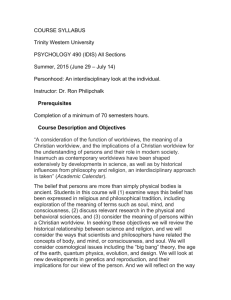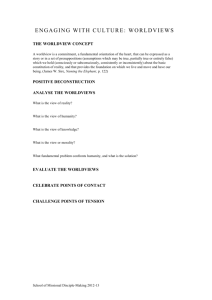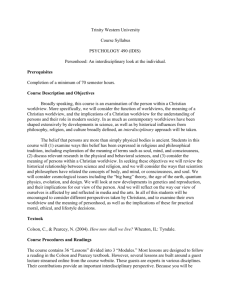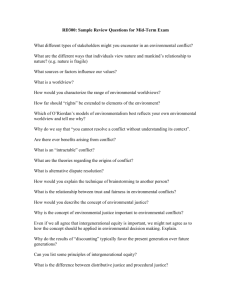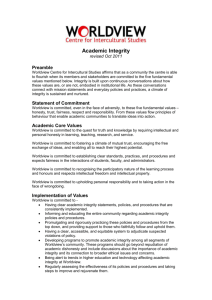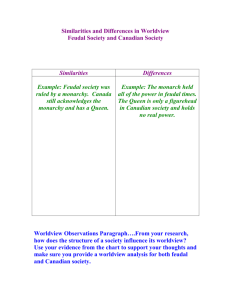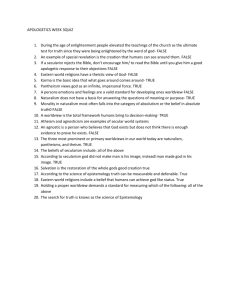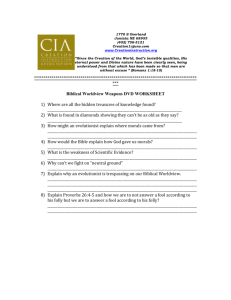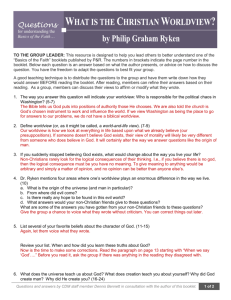course syllabus - Trinity Western University
advertisement
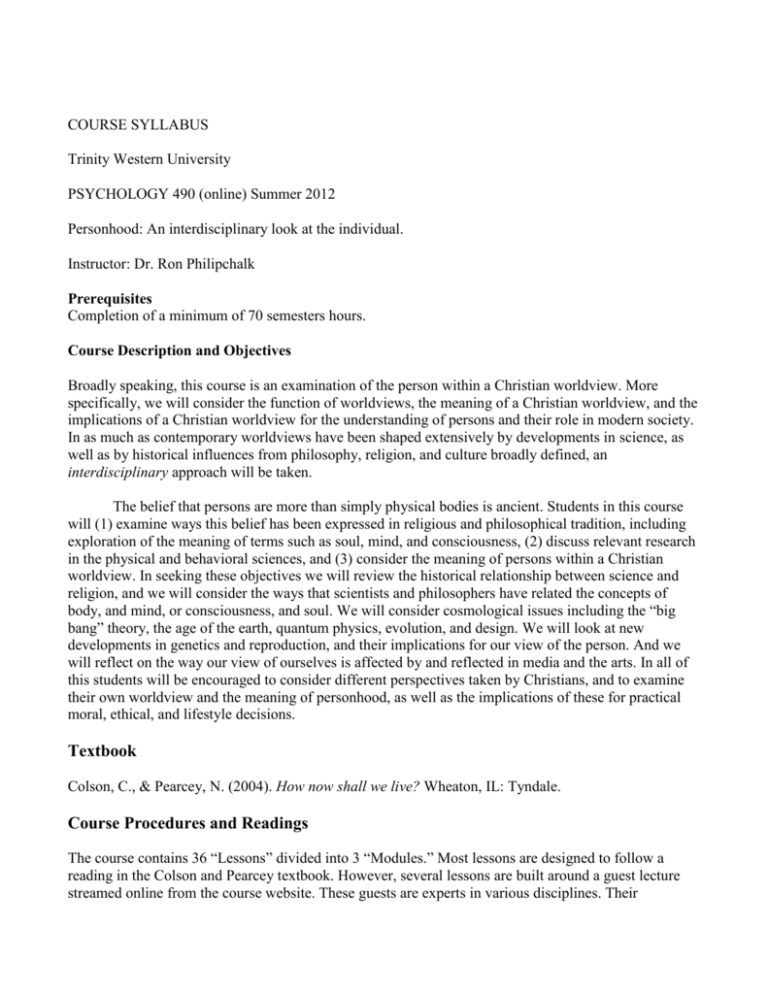
COURSE SYLLABUS Trinity Western University PSYCHOLOGY 490 (online) Summer 2012 Personhood: An interdisciplinary look at the individual. Instructor: Dr. Ron Philipchalk Prerequisites Completion of a minimum of 70 semesters hours. Course Description and Objectives Broadly speaking, this course is an examination of the person within a Christian worldview. More specifically, we will consider the function of worldviews, the meaning of a Christian worldview, and the implications of a Christian worldview for the understanding of persons and their role in modern society. In as much as contemporary worldviews have been shaped extensively by developments in science, as well as by historical influences from philosophy, religion, and culture broadly defined, an interdisciplinary approach will be taken. The belief that persons are more than simply physical bodies is ancient. Students in this course will (1) examine ways this belief has been expressed in religious and philosophical tradition, including exploration of the meaning of terms such as soul, mind, and consciousness, (2) discuss relevant research in the physical and behavioral sciences, and (3) consider the meaning of persons within a Christian worldview. In seeking these objectives we will review the historical relationship between science and religion, and we will consider the ways that scientists and philosophers have related the concepts of body, and mind, or consciousness, and soul. We will consider cosmological issues including the “big bang” theory, the age of the earth, quantum physics, evolution, and design. We will look at new developments in genetics and reproduction, and their implications for our view of the person. And we will reflect on the way our view of ourselves is affected by and reflected in media and the arts. In all of this students will be encouraged to consider different perspectives taken by Christians, and to examine their own worldview and the meaning of personhood, as well as the implications of these for practical moral, ethical, and lifestyle decisions. Textbook Colson, C., & Pearcey, N. (2004). How now shall we live? Wheaton, IL: Tyndale. Course Procedures and Readings The course contains 36 “Lessons” divided into 3 “Modules.” Most lessons are designed to follow a reading in the Colson and Pearcey textbook. However, several lessons are built around a guest lecture streamed online from the course website. These guests are experts in various disciplines. Their contributions provide an important interdisciplinary perspective. Because you will be working on your own, with no scheduled class time, you will need to be self-disciplined. The 36 lessons correspond to the number of 50-minute face-to-face classes usually scheduled 3 times per week over 1 semester. Because of the short time span in which this course is offered, you will need to average more than one lesson per day. Please pace yourself and plan accordingly. Assignments (40%) Many lessons contain a section called “Assignment Possibility.” These are written assignments from which you choose. Each assignment possibility has a mark associated with it, ranging from 20 to 50 percent. You must complete assignments with values that add up to 70 marks for the whole course. For example, you may choose to do assignments worth 20, and 50 percent; or 30, and 40 percent, or 20, 20, and 30 percent, etc.—any combination that adds up to 70. The only limitation is that you should do one assignment from the first module and one from a different module (i.e. don't do all assignments from the same module). Your total mark on these assignments will comprise the 40 percent of your total grade given for “assignments.” These can be submitted through the “Assignment dropbox” online. Please put you name and the name of the assignment at the top, and submit them in MS Word format. N.B.: The first unit assignment is due by midnight June 16, the second by midnight June 30. Online Discussion (20%) You are expected to participate in the online discussion in what is called a “Forum.” The forum discussion takes the place of both in-class discussion and student class presentations in the more traditional classroom setting. You can respond at any time. Forum participants don’t have to be online at the same time. The online discussion is an important part of the course. Each lesson contains online discussion questions to which you may respond. Equally valuable, you may respond to other people’s responses in the forum. N.B.: You don’t need to respond to every question posed in the course materials. On the other hand, you may raise new questions relevant to the lesson or course content. It is important that you respond as you are going through the course materials (i.e., don’t put it off and then try to catch up on the forum at the end of the course). Some important criteria for forum grading are regular participation, thoughtful and concise comments, and interaction with others’ comments. Final research paper (40%) The interdisciplinary research paper is designed to give you the opportunity to delve more deeply into topics related to personhood and worldview. Since this is basically the goal of the course, the research paper will also serve as the final exam. This means that you can filter each topic and discussion for its relevance to the goals of the course. You can also raise pertinent issues as they occur throughout the course, with the final research paper in mind. Special sections at the end of each lesson called “Worldview Reflection/Application” will assist you in thinking along these lines. The research paper should articulate your worldview, giving special attention to the “Who are we?” questions discussed in the course (e.g., “Who am I?” “Where am I?” “What’s wrong?” “What is the remedy?” etc.). You should also deal with at least three of the topical content areas covered in the course. That is, show how your position relates to at least three different areas such as philosophy, biblical anthropology, biology, evolution, genetics, neuropsychology, the new physics, technology, or some of the several cultural topics discussed. For example, in discussing modern genetics the answers to the “Who are we?” questions might be shown to determine one’s ethical and practical conclusions regarding genetic mapping, cloning, etc.. And conversely, developments in these areas might influence your answers to the basic questions about the person. You should expect to develop your position in at least 3,000 words (15-20 pages). Your paper should contain references where appropriate (APA style is preferred but not mandatory), and a complete list of references at the end. However, since this is primarily a personal statement, references may not be necessary. N.B.: The final paper is due several days after the end of the course, specifically, midnight July 7. Evaluation Summary Assignments 40% Participation in online discussion 20% Final exam/worldview paper 40% 100% Academic Integrity and Avoiding Plagiarism at TWU As Christian scholars pursuing higher education, academic integrity is a core value of the entire TWU community. Students are invited into this scholarly culture and required to abide by the principles of sound academic scholarship at TWU. This includes, but is not limited to, avoiding all forms of plagiarism and cheating in scholarly work. TWU has a strict policy on plagiarism (see academic calendar 2008-09, pp. 37-38). Learning what constitutes plagiarism and avoiding it is the student's responsibility. An excellent resource describing plagiarism and how to avoid it has been prepared by TWU Librarian William Badke and is freely available for download (PPT file) or used as flash (self running) tutorials of varying lengths from: http://www.acts.twu.ca/lbr/plagiarism.ppt http://www.acts.twu.ca/lbr/Plagiarism.swf (14 minute flash tutorial) http://www.acts.twu.ca/lbr/Plagiarism_Short.swf (8 minute flash tutorial Further Comments on the Research Paper Some possible points to consider WORLDVIEW Worldview questions: “What is a worldview?” “Why is it important?” “What is my worldview, and how is it different from other worldviews?” “What is the role of tolerance, pluralism, and multiculturalism in our society and in my worldview?” “Who am I?” “Where am I?” “What’s wrong?” “What is the remedy?” “What time is it?” etc. “What does the ‘image of God’ mean?” TOPICAL APPLICATIONS Cosmology: “How old is the Earth/universe?” “Is Genesis 1 to be taken literally?” “How long did God take to create?” Human origins: “Did God create humans instantaneously or over a period of time?” “What do ‘pre-human’ fossil remains indicate (e.g., Neanderthal man)?” “Who were these creatures?” Basis of the person: “What is the relationship between mind, soul, brain, body, etc.?” “Where is the person?” “What happens to the person at death, after death, and at the resurrection?” The person and scientific advances: “How does ones view of the person affect the role they see for science in advancing human welfare, what are the ethical issues, and what principles would you use to resolve these?” - “Is the body sacred, or should we do all we can to improve it through surgery, medicine, and genetic intervention?” “Are all types of genetic intervention acceptable?” “Are all goals of genetic intervention acceptable? Why or why not?” - “Should advances in modern medicine be used to alleviate all suffering, to the point of hastening death?” “If ‘extreme measures’ to save life, especially in the terminally ill, should have limits placed on them, what should those limits be? Isn’t it euthanasia to withhold help when you could give it?” - “How far should couples (or singles) go to achieve pregnancy?” “What about surrogate mothers, test-tube babies, artificial wombs, etc.?” Science and technology: “How does, or could modern physics change the way we see the world?” “How has the technological age affected our worldview and/or our view of ourselves, and how could it affect it in the future?” Gender and sexuality: “What is the role of our gender and our sexuality in our personhood?” “Are sexuality and gender part of the image of God, or part of our fallen nature?” The arts, media, and culture: “What worldview and view of the person are reflected in contemporary art, media, and culture generally?” “What does your worldview suggest would be an appropriate response to culture, or appropriate use of culture (including the arts and media)?” Guidelines for grading research papers: F – Does none of the following. D – Shows minimal grasp of worldview concept and its application to the person and controversial issues of science and culture. C – Presents information on worldviews and the person in well-organized format, with adequate application to issues in science and culture. B – In a well-organized and logical format, presents information on worldviews and the person with carefully thought-out application to several areas of controversy in science and culture, revealing in the process a good understanding of the relevant scientific or cultural background. A – As above, plus, argument and expression must be of the highest quality plus the student’s creative insights and supporting evidence are clearly expressed. Points will be deducted for spelling, grammatical, or typographical errors. As this is a research paper, “supporting evidence” and “revealing a good understanding of the relevant scientific and cultural background” means that your chosen position should be based on factual information. A lot of information has been provided in the guest lectures, group presentations, and assigned readings. Of course you may also cite other reading you have done, including popular media where appropriate. Not everything needs to be documented (e.g., scientists’ claim that the Earth is very old). However, where the claims are controversial (e.g., “Garden of Eden found!”), or particularly significant (e.g., the biblical basis of your position), documentation should be given. Indicate your full sources in the reference section at the end of your paper. I will assign your work a letter grade first, and then in order to combine it with your other marks and reach a final grade, I will give it a numerical percentage according to the following scheme: 94-100 A+ 70-73 C+ 90-93 A 66-69 C 86-89 A- 62-65 C- 82-85 B+ 58-61 D+ 78-81 B 54-57 D 74-77 B- 50-53 D- 0-49 F
